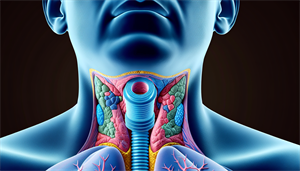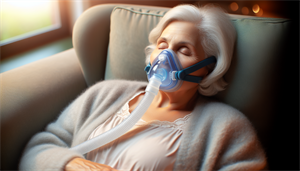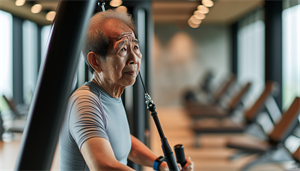Snoring, a frequently joked about but less frequently understood nighttime nuisance, is a well-known bedfellow of many. It’s characterized by that all-too-familiar, less-than-melodious sound we produce when our breathing is obstructed in some way during sleep.
While snoring can occur at any age, have you noticed it becoming more prevalent as you or your loved ones get older? It’s not just your imagination - snoring does indeed become more common with age. But why do we snore as we age? Let’s delve into the science behind this nocturnal symphony.
Key Takeaways
-
Aging increases the likelihood of snoring due to weight gain, particularly in the neck area, loss of muscle tone in the throat and soft palate, and, in women, hormonal changes during menopause.
-
Obstructive sleep apnea, characterized by repeated breathing interruptions during sleep, becomes more common with aging and is associated with serious health risks such as heart disease and stroke. Various treatments include CPAP devices, lifestyle changes, and, in severe cases, surgery.
-
Lifestyle factors like alcohol consumption, use of sedatives, smoking, and poor sleep hygiene can exacerbate snoring in older adults, while solutions for reducing snoring include weight loss, use of nasal strips and decongestants, and treating sinus issues.
Age-Related Factors Behind Snoring

Snoring, often seen as a common sleep disorder, is a result of narrowed or partially obstructed air passages in the upper respiratory system. As we age, there are several factors that could elevate the chances of snoring, including weight gain, loss of muscle tone, and in women, hormonal changes during menopause.
These factors can cause the narrowing or blocking of airways, leading to sleep apnea or obstructive sleep apnea, conditions where breathing periodically stops during sleep. Snoring can then become not just a nuisance, but a significant health concern.
We will now examine these factors in detail.
Weight Gain and Neck Circumference
It shouldn’t come as a surprise that weight gain can contribute to snoring. But did you know that it’s weight gain specifically in the neck area that plays a significant role? Excess weight in this region can narrow the air passages, obstructing airflow during sleep and causing the airway to collapse, ultimately leading to snoring.
Indeed, a direct association exists between a larger neck circumference with an increased risk of snoring and sleep apnea. In men, a neck circumference exceeding 17 inches, and in women, exceeding 16 inches, is deemed a risk factor for these conditions. This means that reducing neck circumference can lessen the severity of snoring, which is especially beneficial for individuals with high blood pressure, as snoring and sleep apnea can contribute to elevated blood pressure levels.
Loss of Muscle Tone in Throat and Soft Palate
Muscle tone - it’s not just for your biceps and abs. The muscles in your throat and soft palate also need to maintain their tone to prevent snoring. As we age, the muscle tone in our throat and soft palate decreases, leading to weakened upper airway muscles during sleep. This can cause the airway to become obstructed, resulting in snoring.
However, the issue extends further. This weakening of the muscles can contribute to cardiovascular disease if left untreated. So, what can be done about it? Specific exercises exist and therapies, such as myofunctional therapy, designed to strengthen these muscles, helping individuals lose muscle tone in the throat and soft palate.
Hormonal Changes During Menopause
For women, the stage of menopause brings about numerous changes, one of which includes a decrease in muscle tone that can contribute to snoring. This is due to a reduction in estrogen levels. Estrogen promotes muscle repair and growth, so when its levels drop, it leads to:
-
the disappearance of muscle stem cells
-
muscle degeneration
-
decreased muscle function
-
reduction in skeletal muscle bulk
-
impaired muscle recovery
This decrease in muscle tone, especially in the upper airway muscles, can result in an increase in snoring. The weakening of muscles, including those in the soft palate and neck, can cause the airway to collapse or narrow during sleep, leading to vibrations and the sound of snoring. This can impact sleep quality and contribute to mood swings. Fortunately, targeted vocal exercises can aid in the restoration of muscle tone in the throat.
Sleep Apnea and Aging

Having understood some of the factors that make us more likely to snore as we age, we will consider a specific condition often associated with snoring - sleep apnea. Obstructive sleep apnea is a condition characterized by blockages in the airways, making individuals experience temporary cessation of breathing during sleep. This condition is often associated with snoring, particularly when the snoring is loud and punctuated by intervals of silence followed by gasps or snorts as the individual resumes breathing.
While sleep apnea can occur at any age, it becomes more common as we get older. The aging process elevates the likelihood of developing sleep apnea due to alterations in both the duration and quality of sleep. This is particularly true for individuals of middle age and older, with a prevalence ranging from 17.8% to 63% in studies. How do we identify and treat this condition? We will investigate further.
Identifying Obstructive Sleep Apnea
Correctly diagnosing obstructive sleep apnea aids in appropriate treatment and improved health. It is important to look out for symptoms such as:
-
loud snoring
-
daytime drowsiness
-
irritability
-
memory and focus issues
-
excessive daytime sleepiness
The diagnostic process for obstructive sleep apnea in older adults typically involves a standard known as nocturnal polysomnography, which is conducted in a sleep laboratory. In some cases, home sleep apnea tests may also be used to diagnose the condition.
Being aware of the prevalent risk factors for obstructive sleep apnea in seniors, such as:
-
Age
-
Obesity
-
Anatomic abnormalities
-
Male gender
-
Smoking
-
Specific medical conditions such as congestive heart failure, hypertension, type 2 diabetes, chronic lung disease, and thyroid disorders.
Health Risks Associated with Sleep Apnea
Sleep apnea is not just a sleep disorder; it’s a condition that can lead to serious health concerns. It is associated with significant health risks such as heart disease, which impacts the function and structures of the heart, and stroke.
Sleep apnea can also impact our metabolic health, potentially leading to the development of metabolic syndrome and an elevated susceptibility to diabetes. On a brighter note, the treatment of sleep apnea, especially with continuous positive airway pressure (CPAP) devices, has shown efficacy in lowering blood pressure levels in patients, thereby contributing to their overall cardiovascular health.
Treatment Options for Sleep Apnea
Several treatment options exist for sleep apnea, ranging from lifestyle changes to medical devices and surgery. Lifestyle modifications can aid in managing sleep apnea and include weight loss, increased physical activity, cessation of alcohol and tobacco use, avoidance of specific medications, adherence to a regular sleep routine, sleeping with an elevated head, and utilizing a humidifier.
On the other hand, CPAP devices aid in the treatment of sleep apnea by delivering a consistent airflow through a mask worn during sleep, thereby maintaining open airways and preventing interruptions in breathing. In severe cases, surgical options are available, such as Maxillomandibular Advancement (MMA) Surgery for airway enlargement and Uvulopalatopharyngoplasty (UPPP) for excess throat tissue removal.
Lifestyle Factors Affecting Snoring in Older Adults

While age-related physiological changes play a significant role in the prevalence of snoring in older adults, certain lifestyle factors can further exacerbate the issue. Factors such as alcohol and sedative use, smoking, and poor sleep hygiene can all contribute to an increased likelihood of snoring.
Alcohol and sedative medications exert a relaxing influence on the muscles of the upper airway, potentially resulting in reduced airway patency, heightened nasal and pharyngeal resistance, and an elevated risk of upper airway collapse during sleep. We will now examine these lifestyle factors in depth.
Alcohol and Sedative Medications
Alcohol and sedative medications can cause the muscles in the mouth and throat relaxing, leading to a narrowing of the airways. This narrowing can increase the likelihood of airway vibrations and collapses, ultimately resulting in snoring.
The use of sedative medications also contributes to snoring by inducing muscle relaxation, which in turn impacts muscle tone and airway dynamics. Using alcohol and sedative medications simultaneously results in further relaxation of the throat muscles, which can cause significant obstruction of the airway and exacerbate snoring.
Smoking and Upper Airway Inflammation
Another lifestyle factor that can contribute to snoring is smoking. Smoking induces the production of pro-inflammatory cytokines, leading to inflammation in the upper airway. This inflammation can result in:
-
impaired function of the cilia
-
increased susceptibility to infections
-
accumulation of mucus
-
facial pain
Over time, smoking can induce or exacerbate symptoms of sleep apnea and contribute to snoring. The good news is, the reduction of upper airway inflammation can commence within the initial weeks to months following smoking cessation. Hence, quitting is beneficial regardless of when one starts.
Sleep Hygiene and Positional Therapy
Lastly, poor sleep hygiene and certain sleep positions can also impact snoring. Keeping a regular sleep schedule and avoiding stimulants near bedtime is beneficial elements of good sleep hygiene.
In terms of sleep positions, specific ones such as sleeping on the back can aggravate snoring. Therefore, it is important for older adults to find and maintain a healthy sleep position, such as sleeping on one’s side, to reduce the likelihood of snoring.
Solutions for Reducing Snoring in Older Adults

Having understood the causes and contributing factors of snoring, we can now examine some practical solutions. These include weight loss, the use of nasal strips and decongestants, and treating sinus infections.
Weight loss, especially around the neck, can significantly reduce the intensity of snoring and enhance sleep quality. Nasal strips can improve airflow by elevating nasal passages, reducing snoring, while decongestants can help alleviate snoring by clearing nasal congestion. We will now examine these solutions in more detail.
Weight Loss and Exercise
Losing weight can greatly help in reducing snoring, especially when combined with regular exercise. In contrast, when people gain weight, it can lead to a decrease in neck circumference and improvements in muscle tone in the airways, resulting in reduced snoring.
Additionally, regular exercise can help to lessen snoring by toning various muscles in the body, including those in the throat and mouth. This muscle toning prevents the airway from collapsing during sleep, which decreases the vibrations causing snoring.
Nasal Strips and Decongestants
Nasal strips and decongestants may prove effective in alleviating snoring caused by nasal congestion. Nasal strips enhance airflow by utilizing ‘spring-like’ bands to elevate nasal passages, thus reducing snoring.
Conversely, decongestants contribute to reducing snoring by clearing nasal congestion, thereby preventing blockage of the nasal passage. Steroid nasal sprays like Budesonide, Fluticasone, and Triamcinolone are especially effective.
Treating Sinus Infections and Deviated Septum
Finally, addressing sinus infections and a deviated septum can also help reduce snoring. Sinus infections can lead to nasal congestion and subsequent mouth breathing during sleep, both of which can significantly decrease airflow and lead to snoring.
A deviated septum, referring to a misalignment of the wall between the two nasal passages, can result in restricted nasal airflow, leading individuals to breathe through their mouths. The mouth-breathing caused by this condition contributes to snoring in older adults.
Summary
In conclusion, snoring is a common issue that tends to become more prevalent with age due to factors such as weight gain, loss of muscle tone, and hormonal changes during menopause. Lifestyle factors like alcohol and sedative use, smoking, and poor sleep hygiene can also exacerbate snoring. However, various solutions can help reduce snoring in older adults, including weight loss, the use of nasal strips and decongestants, and treating sinus infections and deviated septum. By understanding the causes and taking proactive measures, it is possible to reduce snoring and improve sleep quality, leading to better overall health and well-being.
Frequently Asked Questions
How do you stop an older person from snoring?
You can help an older person stop snoring by encouraging them to sleep on their side, use a nasal strip, mouthpiece, or consider weight loss, mouth exercises, quitting smoking, and avoiding alcohol. Surgery should be considered as a last resort.
Why have I started snoring when I never used to?
Sudden snoring can be caused by lifestyle changes like weight gain, alcohol consumption, or lack of sleep. It can also be related to factors such as pregnancy, allergies, or changes in your throat and mouth anatomy.
At what age is snoring normal?
Snoring is considered normal in children 3 years or older, especially during deeper stages of sleep. However, if it is accompanied by other symptoms, it could indicate a sleep disorder.
What causes loud snoring in females?
Hormonal changes, weight gain, allergies, lifestyle, and underlying medical conditions can influence snoring in women. Regular exercise and maintaining a healthy weight can help reduce snoring.
Why does snoring become more common as we age?
Snoring becomes more common as we age due to factors such as weight gain, loss of muscle tone, and hormonal changes during menopause in women. These contribute to the narrowing or blocking of airways, increasing the chances of snoring.


